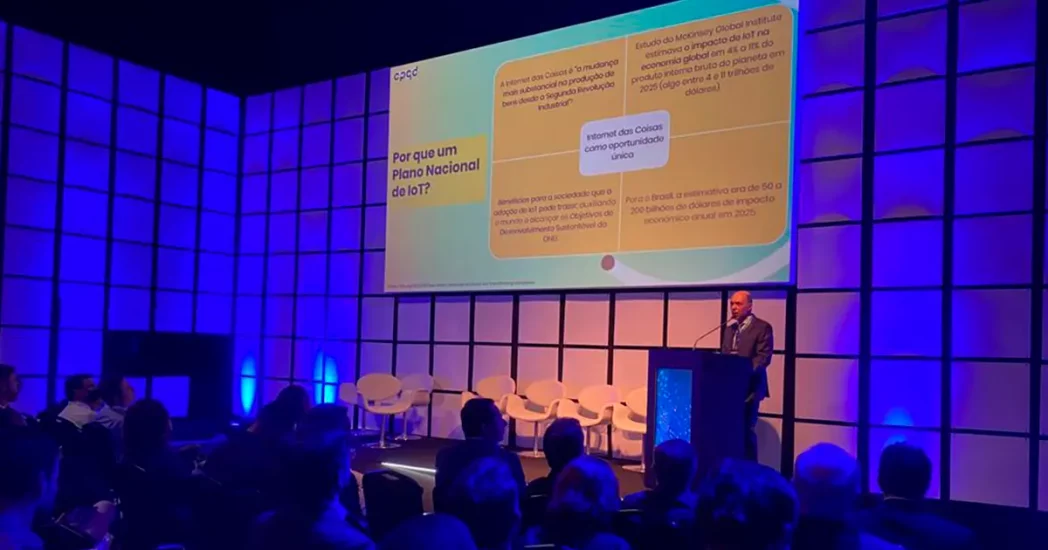No Futurecom, CPQD aborda IoT e cidades inteligentes
Organização participou do congresso desse evento, que é um dos mais importantes do país na área de TICs
Internet das Coisas (IoT) e cidades inteligentes foram os temas abordados pelo CPQD em sua participação no congresso do Futurecom 2022, um dos mais importantes eventos do país na área de TICs, que aconteceu entre os dias 18 e 20 de outubro, em São Paulo. Na edição deste ano, que voltou a ser realizada em formato presencial, o evento recebeu mais de 30 mil visitantes de várias regiões do Brasil – e também de outros países – e contou com cerca de 4.800 congressistas, em oito palcos simultâneos, que proporcionaram ao público um total de mais de 200 horas de conteúdo.
O presidente Sebastião Sahão Júnior foi convidado a fazer uma palestra, no primeiro dia do evento, sobre o tema “Internet das Coisas: um plano de ação para o Brasil”. Em sua apresentação, ele lembrou a motivação que deu origem ao Estudo Nacional de IoT, conduzido em 2017 pelo consórcio formado pelo CPQD, McKinsey & Company e Pereira Neto/Macedo Advogados – e que serviu de base para o Plano de Ação de Internet das Coisas, que completa cinco anos neste ano.
“O objetivo do estudo foi avaliar qual seria o impacto da Internet das Coisas em diversos segmentos da economia, o que levou à definição das verticais que deveriam ter prioridade no Plano Nacional de IoT: cidades, indústria, saúde e agronegócio”, contou o presidente do CPQD. Ele ressaltou a importância do estudo como alicerce para a criação de políticas públicas nessas áreas e destacou algumas iniciativas do CPQD a partir do Plano Nacional de IoT – entre elas, o desenvolvimento de aplicações e cases nas quatro áreas prioritárias, utilizando tecnologias de Internet das Coisas e, também, de segurança cibernética, blockchain e 5G.
“O 5G traz maior capacidade de transmissão e reduz a latência nas conexões em aplicações de Internet das Coisas”, explicou. “Isso abre caminho para o futuro, com a integração de Inteligência Artificial e IoT, que vai permitir tratar grandes bases de dados com maior assertividade e produtividade visando melhorar as condições de vida da sociedade”, concluiu.
No dia 19, o gerente de Desenvolvimento de Negócios Maurício Casotti representou o CPQD no painel “Integração das Coisas: a vida das smart cities depende da colaboração entre as iniciativas públicas e privadas”. Mediado por Leopoldo de Albuquerque, presidente global do Instituto Smart City Business America, o debate contou também com a participação de Maria Teresa Lima, diretora da Embratel, e de Fernando Gomes Dias Neias, do grupo de investidores anjos Poli Angels.
Em suas considerações, Casotti ressaltou a importância da inovação aberta e do engajamento dos diferentes atores que formam o ecossistema local de uma cidade. “Uma cidade inteligente não se concentra apenas na prefeitura ou em uma empresa; é preciso envolver um ecossistema de negócios”, explicou. Como exemplo, ele mencionou a iniciativa Open 5G@Campinas, lançada neste ano por um grupo de parceiros – entre eles, o CPQD – com atuação na cidade de Campinas.
Ao responder a uma pergunta do mediador, Casotti enumerou os quatro principais desafios enfrentados pelas cidades inteligentes no Brasil: a característica continental do país, com seus mais de 5.400 municípios com realidades distintas; a falta de conhecimento técnico dos gestores; a existência de silos de dados, que muitas vezes não são compartilhados, e a não disponibilidade de recursos para investimento em inovação. “É preciso entender o problema de cada município para depois buscar a solução adequada e, para isso, é importante ter conhecimento tecnológico”, enfatizou.
Casotti apontou ainda a questão regulatória como outro desafio para as cidades se tornarem inteligentes e sugeriu, como alternativa, o uso do recurso de sandbox regulatório – que suspende temporariamente a obrigatoriedade de cumprimento de normas em determinados setores, permitindo que empresas possam usufruir de um regime diferenciado para lançar produtos e serviços. Além disso, destacou a importância da integração das coisas, por meio do uso de ferramentas abertas – como a plataforma dojot, desenvolvida pelo CPQD. “Com isso, a prefeitura pode comprar componentes de fornecedores diferentes, sem ficar refém de um único fornecedor, e ainda garantir o sucesso da implantação de seu projeto IoT”, acrescentou Maurício Casotti.
